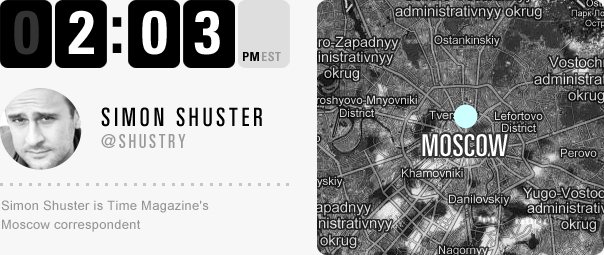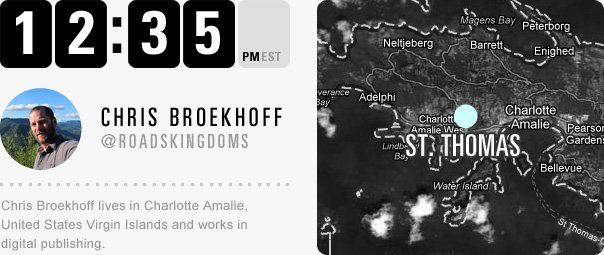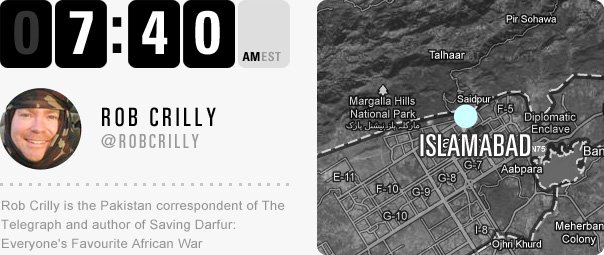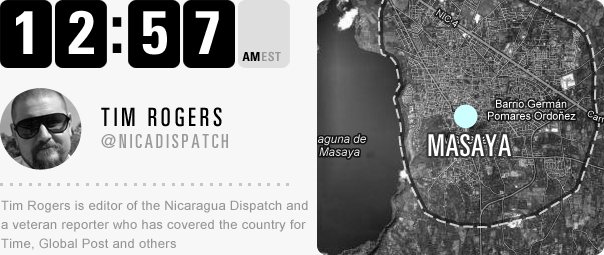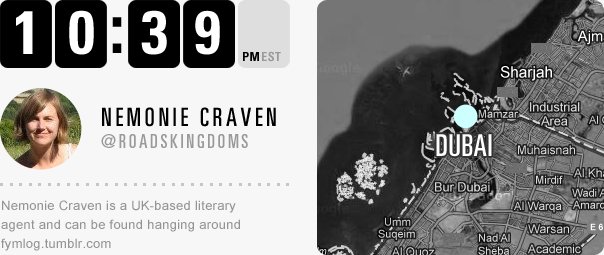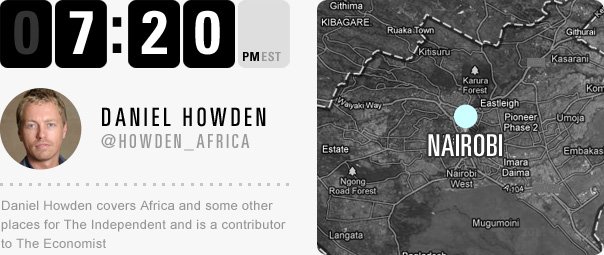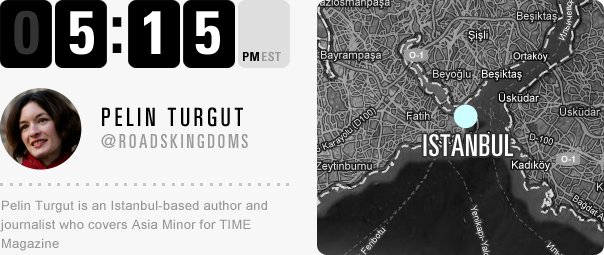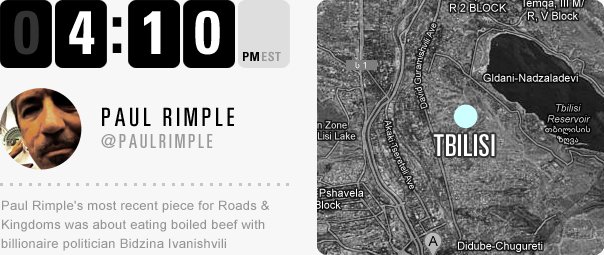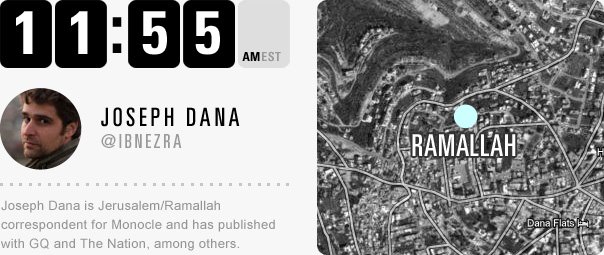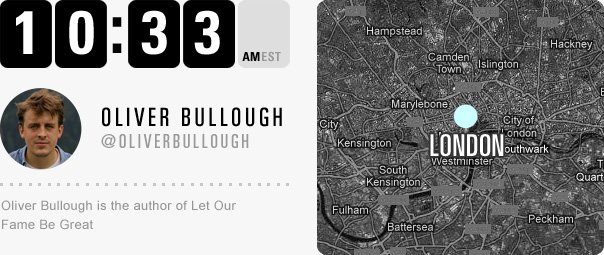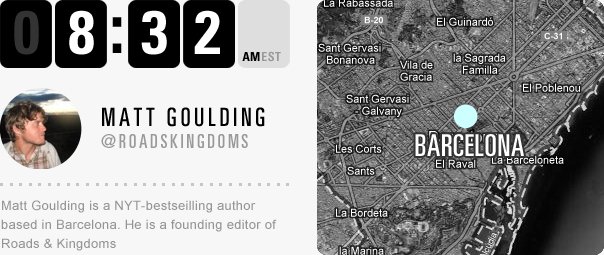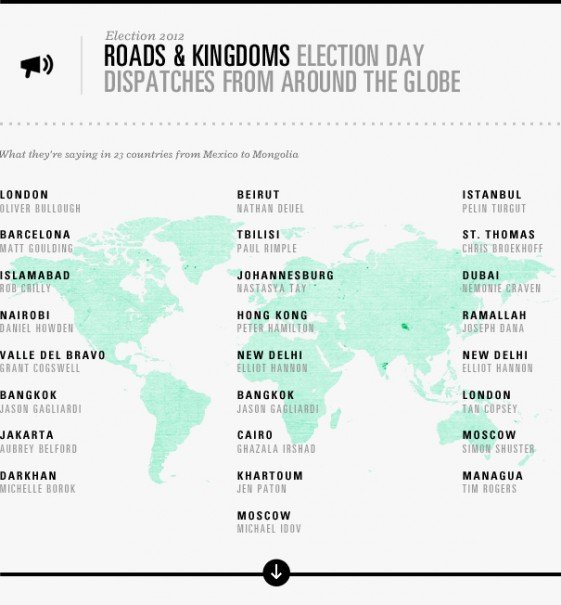
The World is Watching

24 reporters in 22 countries file live reports about the world’s reaction to the 2012 US Elections
Election Dispatches:
Tuesday
8:32 a.m. EST Introduction: Does this election still matter overseas?
9:45 a.m. EST A tarantula and ominous feelings in Beirut
10:33 a.m. EST Sneaking updates in the British Library
11:55 a.m. EST Disappointing choices in Ramallah
1:33 p.m. EST Looking for entertainment in Mongolia
2:40 p.m. EST In Patpong, debating whether politics sucks
4:10 p.m. EST Georgians and the politics of personality
5:15 p.m. EST A hunger strike in Istanbul
7:20 p.m. EST In Kenya, a more subdued fan base
9:01 p.m. EST Dancing disdain for US politics in Cairo
9:46 p.m. EST Rumor of Nate Silver in JoBurg
10:39 p.m. EST Election notes from the Sharjah book fair
11:31 p.m. EST In London’s rowdy, lefty Bethnal Green
Wednesday
12:04 a.m. EST Fatalism from Valle del Bravo, Mexico
12:57 a.m. EST In Nicaragua, parsing GOP’s Hispanic problem
3:12 a.m. EST Barcelona greets election with silence
7:40 a.m. EST Islamabad: not as pro-Romney as they say
10:33 a.m. EST Looking for bunting in Moscow
11:43 a.m. EST Hong Kongers toast Obama, check the markets
12:35 p.m. EST Voting for Presidente (the beer) in USVI
2:03 p.m. EST Moscow’s political hooligans and other radioactives
3:16 p.m. EST With Obama’s lookalike, in Jakarta
Location: Amigos Tex-Mex Restaurant, Jakarta
The Amigos Tex-Mex restaurant sits inside the Bellagio Mall, an imposing but fairly unconvincing imitation of the Las Vegas casino in downtown Jakarta.
Four years ago, hundreds of expat Democrats, other Westerners and Indonesians packed this restaurant to watch Barack Obama, famous local son, become the first US President who has ever heard of bakso – Indonesian meatball soup. There were plenty of tears and pretty much everyone stumbled home drunk.
This time the crowd was smaller and more reserved. Perhaps 40 people made it to the bar, picking at the Mexican buffet, using the 12-hour time difference as an excuse to order pre-noon beers and hogging the wifi bandwidth checking live poll updates. With the exception of a couple of international political junkies and a few desperate-looking Indonesian news crews – one of which filmed me in close-up ordering a beef burrito – the crowd this time was exclusively American.
A cheer went up when CNN called it for Obama, that and a couple of audible sighs of relief. Indonesia as a whole has never really turned sour on Obama. The fact that he lived as a child here, visited as president, and has publicly made a few mangled attempts at the language means he’s held in almost retro-2008 regard by many Indonesians, about 90 percent of who are Muslim. This is a country, after all, where a mawkish film about Obama’s boyhood in Jakarta can get a nationwide release. I’m sure there are expat Republicans here – in the corporate world or mining, maybe – I just haven’t met one in six years. Ditto for Indonesians with kind words for George W. Bush – or pretty much anything to say about Mitt Romney.
It probably helps that the global financial crisis never hit Indonesia, which is in the middle of a sustained boom.
A couple of Americans pulled out the original model for a bronze statue of a young Barry Soetoro – as the president was once known – with a butterfly on his outstretched hand and paraded it in front of some news cameras. The finished statue sits out the front of one of Obama’s old schools, Elementary School 1 in the tony neighbourhood of Menteng, and where media reports showed students crowded on the floor to watch election returns this time.
Still plenty of goodwill this time, just not so much hype.
After I got home, I called up the man with the most visceral experience of how Indonesians view Obama, his uncanny local lookalike, Ilham Anas. Ilham, a former photographer, gained national fame and a comfortable new career when Obama first launched his presidential bid. Since then, his monthly income has been a barometer of sorts of what Indonesians think of the president.
And how’s business? Good, but not great. As the years have passed, people have not fallen out of love with Obama, but the lucrative infatuation has faded. Ilham has recently decided to supplement his income by launching a lookalike business along with doppelgangers for Michael Jackson, the Rowan Atkinson character Mr. Bean, and the Bollywood star Kareena Kapoor. Obama’s reelection, unsurprisingly, is good for business.
“The lookalike business follows the euphoria of the people,” Ilham explained.
“Before, when Obama arose, everyone was curious about him because he lived in Indonesia. Once he became known, this enthusiasm declined.”
But that doesn’t mean people are disenchanted with Obama, despite what Ilham termed his “slowness” in repairing relations with Muslim nations.
“If you’re selling glasses with Obama’s face on them, they’re still going to sell really well, because people know him and like him,” Ilham said.
“The loyalty of the Indonesian people, for Obama, it’s still there.”
Location: Some bars and a mansion in Moscow
The group of Russian muck junkies were standing outside the ambassador’s place as usual. On other days, when the embassy hosts these kinds of things, a full news van from one of the propaganda channels will sometimes show up with a satellite dish, keeping their creepy vigil until they catch some dissident going in or out. “Why are you America’s stooge?!” they’ll shout, pointing the spotlights. “How much is the State Department paying you!?” The victim leers, or forces a smile as he shoulders past them through the gate. And it’s a job well done for the ministry of truth, on a good day.
But on election night it was just three skinny roughs with a camcorder, one wearing a funny fur hat with the ear flaps down. People call them Naschists, or Putin-jugend. They looked bored, probably because only a few Moscow bloggers and intellectuals showed up to the election party. The viewers of state TV do not need any special video exclusive to be convinced that these “liberasty” are paid with stacks of dollars by the ambassador himself. So tonight there would be no sensations.
I had spent the previous couple of hours checking out the burger joints and expat bars for signs of election fever and found none. A place called the Hudson Bar, run by twin brothers from Brooklyn with the personalities of Jekyll and Hyde, had put up some balloons and came up with a special cocktail, the Obamanation, which had the same recipe as a Black Russian. No one was biting. A few Americans sat sucking down the longneck Budweisers at 70 rubles ($2.25) a bottle, which in Moscow means basically free. But no conversation could focus for long on the vote. It switched inevitably to the topic of import-export. What does one do, for instance, with a haul of raw Russian titanium? Prosthetic limbs, I suggested. Too niche, was the answer. Stumped, the twins and I looked up at the CNN broadcast to learn that “Health, Death and Marriage” were being decided in these elections, but the sound was off. So no one could tell what it meant.
It felt strange after this to enter the ambassador’s estate, which is in the center of town. It was like walking through a wormhole into a star-spangled place where people smile and smoking indoors is forbidden. Folks were lining up to pose for pictures with the cardboard cutouts of Romney and Obama. There were elaborate balloons, and on a flatscreen television, a DVD of the vice presidential debate was being looped, over and over again. It mattered here, even though the sound was off. It was important.
With his hands behind his back, the ambassador was working the room, informing clusters of people that he was “generally optimistic.” The next morning it turned out he had been right. Obama won. But his smile at the time was false. He looked nervous standing there under the giant painting of a Native American chief that he had ordered installed in the reception hall. If the swing states had swung the other way, the chief would have to be bubble-wrapped come spring, shipped back to California. Something else would replace it. But the house would remain, and so would the Putin-jugend, waiting to hound the new guy outside the same gate.
The party ended abruptly at 10:30, when a butler closed the door of the room where the bar had been. Outside the Naschists were gone, and a cluster of Americans formed out in the street refusing to go home until they had another drink. Around the corner we found a bar, American by the look of it, or maybe British, but without any outward awareness of the elections, which took some getting used to after exiting the wormhole.
The city didn’t seem to care. The traffic ground on. And it did not take long for us to realize that our table of expats was not split between Democrats and Republicans, but pessimists and masochists. We could agree that no matter how the elections went Russia was getting worse, like a man getting crankier with age until he sits all day on his stoop with a shotgun and a bible, minding the lawn. The choice was either to embrace this as an interesting historical development or move the hell out of the away. On this we could not agree. “In some sense it would be good,” said one of the journalists at the table. “If Romney wins things might pick up. It’d be like Russia becoming the Weimar Republic. The apocalypse, you know?”
He was joking, I think, but he had a point. The most common answer I heard from Russians about why they supported Romney (and many of them do, especially the men) was that “things are clear” under Republicans. They hate Russia openly, while the Democrats are sneaky with their hate. The choice in the minds of such Russians is not whether to improve or worsen relations, but whether to receive the American knife in the chest or in the back.
Our conversation at the bar also seemed incapable to sticking to the elections, so eventually it turned to radiation. “This napkin holder,” said the man to my left. “It could have plutonium in it. We don’t know. We have no way of checking.” It was a hell of a thing to drop on a bunch of half-drunk people at midnight, and the only thing to do was stare at it, take a sip of your $12 beer, try to think of hope and change.
The guy who said this may or may not have been from the CIA. In any case, he spoke with confidence about the way that Russia guards its fissile material. Some of it is dumped in regular scrap yards, he claimed, and hobos come around to collect the irradiated stuff, turning it in to be recycled into things like napkin holders. There was nothing the U.S. could do to stop this, and so on. From somewhere behind me a group of Russians yelled at the TV screens, which were showing a football game. I couldn’t tell who was playing or whether it was important. But at least the sound was on.
Location: Big Bamboo Bar, Red Hook, St. Thomas, United States Virgin Islands
By 10:30 last night I had already voted for Presidente four times. Had I been stateside, I would have opted for a craft beer, something hoppy like an IPA. But here in this far-flung US territory the beer selection tends towards the large domestic and regional mega-brews: Budweiser, Coors, Miller, Corona, and the aforementioned Presidente. With my plate of locally-caught Mahi fish tacos, dub playing loudly in the background and election results streaming in on the flat screen TVs encircling the Big Bamboo’s tiki bar, the ice-cold pilsner from the DR seemed an appropriate choice. Two Rastas joined me at the bar and as the silent screens showed Florida on a razor’s edge one began a ragga-style mumble ad lib from which I could make out the words “he’s a big brown man,” “elections,” and “Florida.” I’m willing to call that as a vote for Obama.
Had I been stateside, and not a USVI resident, I also would have actually voted for President yesterday. As an unincorporated US territory the Virgin Islands do not have any electoral votes. Given the enthusiasm with which Virgin Islanders perform their electioneering I suspect that if they could vote for President the turnout would have been high. As I walked to my polling station yesterday afternoon for the local elections I passed a throng of school girls in day-glow campaign t-shirts doing jumping jacks to marching band drums, Soca music from a rival camp threatening to drown them out, and as I got closer, a group admonished me to “vote the Roach approach!” (Full disclosure: I did.)
The more than 100,000 residents of the US Virgin Islands are American citizens. They’re mostly of Afro-Caribbean descent, lean heavily democratic, and if they could, would almost certainly have voted overwhelmingly for Barack Obama. In the hallway of my polling station were photos of President Obama, but not the official headshots you might see in the DMV. Instead there was Barack addressing a crowd, arms outstretched, shot from below. Barack in an oxford shirt, sleeves rolled up, painting a house blue. Each photo accompanied by an italicized inspirational quote. A group behind me in line was talking nervously about firewalls and battleground states.
Despite the tough economy of last four years for this small US territory, the yes-we-can sentiments of 2008 still seem alive and well. But when comes to voting for President, no we can’t. All the attempts to give Virgin Islanders full representation in DC since the US bought the islands from the Danish in 1917 have failed. So for now, we vote for Presidente instead.
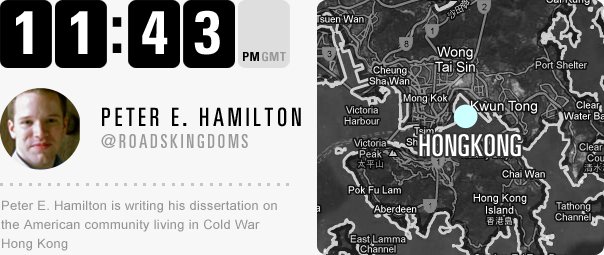
Location: American Chamber of Commerce, 3 Pacific Place, Hong Kong
Gauging Hong Kong people’s feelings about the 2012 U.S. presidential election is tricky. While Obama’s personal narrative holds great appeal here and throughout China, the driving local concern is economic. Which candidate would better serve the global economy? And which candidate will irrationally bash China less? In this frenetic city with a voracious appetite for profit, people have been watching and waiting, as they might await the finale of an anticipated TV show. When CNN erected election billboards in the Central MTR station a few days ago, rushing commuters actually paused for a quick look before hurrying along.
At the American Chamber of Commerce’s “Election Central” morning watch party, however, the crowd was diverse and engaged, fueled by free Starbucks and live streaming CNN. American political junkies conferred over the results with interested Chinese, Canadian, and British professionals. All the local TV stations sent camera crews, while Chamber and U.S. Consular officials gave speeches. Eager students from Hong Kong International School canvassed the room, handing out buttons and ushering guests to vote in the event’s mock election. Despite an expatriate population with a healthy share of natural Romney supporters (read: financiers), the result was remarkably lopsided—82 for Obama and 27 for Romney. As a result, when Obama’s real victory was announced, there were sustained cheers and the popping of champagne.
Outside the party, though, the uncertainty continues for most Hong Kong people. Robust global trade and productive U.S.-China relations are what matter to this city—and America’s fiscal cliff looms. They like Obama here, but their real support hangs on responsible decisions from Washington. And yet, no one is stressing quite yet, perhaps because Hong Kong is so good at political uncertainty. This former British colony survived both the Cold War and the 1997 handover as a ragdoll pulled between the interests of Beijing and Taipei, London and Washington. Tomorrow, Hong Kongers will keep zooming along as they always do: cheering for Obama, but only after double-checking stock movements and real estate prices around the world.
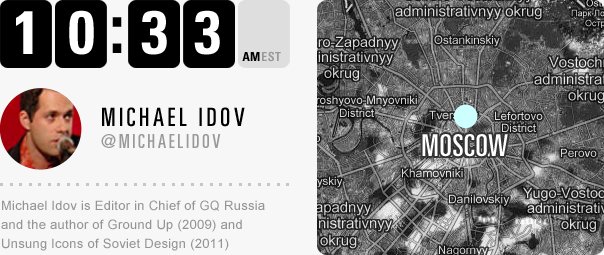
Location: US Officialdom in Moscow
Having filed too late to have our absentee ballots mailed to us, my wife and I finally scrambled to the US embassy on Novinsky Boulevard for a last-minute vote. It took some effort to get my sense of civic duty revved up, since my vote would go to New York—the state that rarely if ever posts margins narrow enough for the absentee ballots to be counted. Luckily, I had the all-enveloping Russian cynicism to keep me going: I do, after all, live in a culture where millions are convinced that their ballots are going to end up lining a hamster cage, and even take a kind of pride in “seeing through” the supposed ruse; as a result, Putinism is a largely self-fulfilling prophecy. I figured I can’t fall into the same trap. So off to vote I went.
The American Citizens’ Services wing of the embassy had all the mirthlessness of a DMV, without any of the bustle. Only one out of three windows had a clerk behind it, and there was only one voter in the room besides me. A bald, surly Russian guard made me turn off and hand over my phone (but not before I snapped a shot of him and the empty room beyond). “You’re, what, here to vote or something?” he asked, arching his eyebrows and letting out a derisive snort. I decided to call him on it. “Why are you smirking?” I asked. “I mean nothing but total respect,” he said even more facetiously. When I asked him his name, just for the hell of it, he flipped his name tag so I wouldn’t see it. “I’m in security services. I don’t have to tell you anything,” he said.
Having completely ruined my mood, somewhat artificially buoyant to begin with, I went up to the window and got my ballot from another, marginally more polite, Russian employee. Truth be told, I had been kind of hoping the place would be staffed with smiley Midwesterners barely suppressing conspiratorial we’re-in-this-together winks. Instead, the only Americans in the room were Obama, Biden and Hillary Clinton, whose state-issued official portraits hung arranged in a tight triangle on one of the walls. I filled out the form, glancing periodically at the portraits, sealed it in a blank envelope, sealed that envelope in another envelope, addressed it to the New York County Board of Elections (a few buildings up Varick Street from my last place of work, New York Magazine), and handed it to the clerk. His look was conspiratorial, all right. It said the moment you turn away this ballot is going into a shredder.
Luckily, the next stop was a party at the Spaso House, the U.S. Ambassador’s residence. The Spaso House is a mansion off Arbat Street; it has served as the premises for Satan’s ball in Bulgakov’s The Master and Margarita. Every once in a while it fills up with lesser imps, like Russian journalists and expat NGO brass, who come to devour the kitchen’s faithful reproductions of Pizza Hut and Taco Bell and to get photographed next to Michael McFaul, the garrulous, Montana-born, Obama-appointed ambassador. Tonight, the theme was the election, obviously. Cardboard cutouts of Obama and Romney stood against a backdrop of red, white and blue balloons; on a giant TV screen, Wolf Blitzer was treading water until the first polls closed; a mock voting booth allowed the guests to cast mock ballots. Ah, that’s better. I finally got my dose of unironic American dorkiness, which was precisely what I had hungered for the whole day. For the record, Obama won the mock Spaso House vote, too. It was a landslide: 134 to 27.
Location: Residence of Richard Hoagland, Chargé d’Affaires, US Embassy
No relationship takes up more time, effort and space in either capital than Pakistan’s fraught alliance with the United States. Yet, Islamabad woke to news of an Obama victory with an unimpressed yawn.
In a country riddled with anti-American feeling there were few election parties and several of the morning’s newspapers focused on the latest spat between the country’s courts and its military rather than latest poll predictions. It was easy to see why. Few were predicting much change for Pakistan.
“The main thing people care about is the drone strikes,” said a TV cameraman, setting up his gear outside the residence of the US embassy’s chargé d’affaires. “We all know that will not change whoever is in power.”
Inside, the political elite – ministers, generals, television talk-show anchors – gathered to watch the results come in as the sun rose. Uncle Sam and the Statue of Liberty mingled with guests, handing around doughnuts and freshly brewed coffee.
A recent poll conducted by the BBC of 21 countries found Pakistan to be the only nation backing Mitt Romney – but even then only by 14% to 11%, suggesting three quarters of the population were resigned to more of the same whoever was in power.
However, Talat Masood, a retired general, said many decision makers would be happier with a second Obama term. “There may not be a lot of difference in their foreign policy. Plenty of people don’t like Obama because of the drones issue,” he said. “The good thing, however, is that this means there will be continuity and at least Obama knows who and what he is dealing with.”
As guests gathered around the TV screens to watch Romney concede the election to Obama, news was filtering through of a suicide bombing in the northwestern part of the city. Six people, including a police officer, were dead. Business as usual in more ways than one.
Location: Apartment in Barcelona’s Gothic Quarter
Barack Obama is once again the 44th president of the United States.
I step out onto my balcony for confirmation, expecting to hear as I look down on the crumbling Roman walls that surround Barcelona’s Gothic Quarter the same firecrackers I hear every time FC Barca scores a goal, or even a few rogue cries of relief from the dedicated few who put off bedtime to see the results roll in. Something to mark the fact that after $4 billion dollars’ worth of mud slinging, America has gifted the world another four years with a perfectly decent leader.
Instead, there is the distant din of taxicabs and the spray of a street cleaner raining down on the sidewalk. An old man shuffles past a street lamp with his black terrier in tow. A text arrives from a Catalan friend: “Whoever wins, wins. The rest of us will go to work tomorrow.”
It’s true that the front pages of El Pais and La Vanguardia tomorrow will be carpeted with pictures of Obama hugging Michele, of Obama at the podium, looking like a man just happy to still be standing, telling the flag wavers before him that there is no such thing as blue states and red states. A few of the old men at the bodegas down the street will turn their focus from futbol to politics for a minute or two, and the people that I know might pat me on the back and offer a word or two of congratulations. This is not the response I was expecting.
What I remember most about the moments after Obama’s victory in 2008 is the noise—not just the teary exultations from the beaming blues I celebrated with, but the sounds from the street as I stepped out into the Allentown, Pennsylvania night: honking cars, blaring music, people spilling out onto the stoops from house parties that soon became block parties.
Perhaps the loudest noise that night was the sound of Obama himself, as he took to the stage in Grant Park to usher us into the history books, to take us on one last crazy flight on the wings of his soaring rhetoric. As he pushed out those last words into the cold Chicago night four years ago—“and God Bless the United States of America”—the world’s ears were ringing.
But tonight, in a country mired in a Great Depression, with a 25 percent unemployment rate and a deep-seated disdain for politics of all colors, I stare out at a city of two million silent souls and wonder where the noise went.
Location: The Marketplace in Masaya, Nicaragua
The sweaty and fly-pestered Cafetín Sacuanjoche, a tiny bar with high concrete stools lining a U shaped ceramic-tile bar in the corner of the Masaya marketplace, seems worlds removed from the U.S. political scene. But the few diurnal drinkers who have ducked in to seek reprieve from the brutal mid-afternoon sun with a cold beer or six, are acutely aware of what’s at stake in today’s presidential election—both for Nicaragua and for their inevitable family member living in los Estados Unidos.
“Obama is going to win—I would bet on it. And that’s a good thing for Nicaragua, because Obama is much less aggressive than Romney would be. Obama is trying to end wars, and the Republicans like the war business because they are linked to the military industrial complex,” says bar patron Pablo David Favilli, in a voice slightly louder than necessary.
Favilli is a 48-year-old industrial engineer who lived briefly in Florida and still has family there. Like many Nicaraguans, he toils in the tourism industry because he couldn’t find work in the field he studied as a young man in university.
Favilli was talking animatedly about motocross with the guy sitting next to him when I walked into the bar, but seamlessly shifted his enthusiasms to the U.S. elections.
“The whole world likes Obama better,” Favilli said on behalf of mankind. “Romney thinks he’s a player, but he’s not.”
If Romney wins, Favilli says, the Republican White House will take a tougher stance against the leftist Sandinista government of Daniel Ortega, which on Sunday was accused of rigging its third consecutive election—an event that was sharply criticized by the State Department last night. Political relations between the Obama and Ortega administrations are already now in a deep diplomatic freeze, but that hasn’t affected trade or tourism, so most Nicaraguans don’t notice or care.
Favilli fears that a Romney administration would lead to more confrontational rhetoric that would scare away U.S. tourists. He’s also afraid a Romney administration would try to pinch the $1 billion in Nicaraguan remittances sent back from the United States each year, providing a vital source of income for 50% of Nicaraguan families.
On the next barstool, Armando Ingerman Alegria, 21, works on his fifth beer and nods in agreement toward the four empty bottles in front of him. “My mom has lived in the United States for six years and she supports Obama because he is better to immigrants,” Ingerman says, in a slow and deliberate voice that suggests there might be other empty bottles I don’t know about. “Romney would be more strict and discriminatory, because all the Republicans are white… no offense.”
I assure him none was taken.
The two men’s affinity for Obama and suspicions of Romney are consistent with recent polling, which shows that 51% of Nicaraguans want Obama to beat Romney, compared with less than 6% support that Romney enjoys from Nicaraguans.
In fact, it’s one of the few issues upon which Sandinistas and non-Sandinistas agree in Nicaragua. Even the remnants of the country’s feckless and balkanized right-wing opposition prefer Obama 2:1 over Romney, according to the same M&R Consultants poll.
While Favilli and Ingerman will be watching the vote returns from the edges of their barstools—if they can hang on to them that long—most Nicaraguans will be watching the news with less somewhat less intensity. The U.S. election, while important to many Nicaraguans who rely on remittances, doesn’t have the same sense of urgency that previous American elections had when Nicaragua was still in the crosshairs of U.S. foreign policy.
Indeed, the M&R poll shows that 42% of all Nicaraguans don’t care about the U.S. elections at all. Regardless of the Obama leanings of Cafetín Sacuanjoche, it’s clear that 22 years after the end of the contra war, U.S. presidential campaigns are no longer a matter of life and death for Nicaragua.
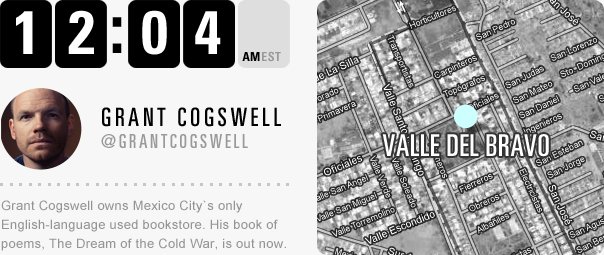
Location: Cyber Centro Valle internet cafe, Valle de Bravo, Mexico State
I’m failing to witness this election in Valle de Bravo, two hours in the wooded mountains outside Mexico City. This is a favorite retreat from the capitol, but midweek the tourist restaurants are shuttered and the streets between the second houses of the city rich are quiet. The little park in front of the church is in downtime, locals (but for my girlfriend and I) only, and as always the public murmuring, the constant life, of my adopted country demonstrates its resilience and tragic acceptance. This may be the night of the most important election in the world, but this corner of the globe isn’t holding its breath.
A Carmelite retreat just out of town lets visitors in between the hours of four and six, to wander whispering through its heavy-pewed Modernist church and shoeless and silent through its truly sacred-feeling meditation room, whose Christ and Mary seem too human. Outside the open stained glass windows the sun is going down chilly in cloud over the dark jungle. I tell my girlfriend I want to come back here in two hundred years (it looks like it will still be standing).
Two centuries from now, what will this place be like? Probably it will exist in a world containing far fewer people, after the famines that our weather, only beginning to change, will bring; there will be far fewer species of animals, unless someone has done something, the oceans will be entirely full of plastic—if not floating to choke what animals more likely no longer exist, more likely broken down into the trace particles which are probably responsible for the rising levels of autism (a mystery!) and cancer (a mystery!). Even with the global climate staging a plainly political demonstration on the East Coast a week ago, there was no mention in the debates nor the messages of either campaign of the issues that will last beyond our own time and make the world of our grandchildren one more frightening, desperate, divided and ugly.
After weeping with joy at Obama’s election four years ago, thinking we’d turned a corner and were finally awake, I failed to vote in this presidential election, the first I have missed since I was too young to vote for Walter Mondale. If Obama wins, the drop will be slower and softer, and the illusion of our specialness, our God-chosenness, will last perhaps another lifetime, whereas if Romney wins things will get bad even faster.
The best thing (and the worst thing) about Mexico is its tragic sensibility: it knows politics are a dirty game beyond redemption, and the criminals are always (and have always been) in charge. (I should say here that I spent all of ten years fighting to build public transit in Seattle, a thing that might seem relatively easy.) It slows life here, lets it be enjoyed beyond hopeless dreams of human improvement—and it’s why it’s also so hard to get anything at all done. In the U.S., it’s the reverse: our constant program of self-improvement has made us the richest nation in history, and given people who are treated as property elsewhere some equity with the ruling class. But we, as a people, fail to see how fixed and corrupt the whole thing is, and how doomed.
The town is closing down, and I’m headed back to the capital see which way for now the wind is going to blow.
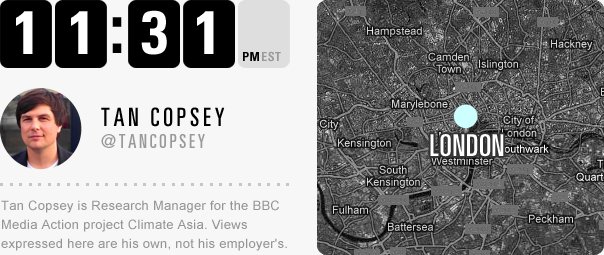
Location: Bethnal Green Working Men’s Club, East End of London
It’s a cold grey Tuesday evening in London East End when I arrive at Bethnal Green Working men’s club. The name may conjure up images of smoke-filled rooms and powerful trade unions, but inside, hipper haircuts have replaced barrow boys.
Though times have changed, politics down Bethnal Green remain reliably left-wing. Locals elected George Galloway in 2005, a firebrand, frequently anti-American politician. Tonight it’s a young crowd of activists, students, comedians and the odd, baffled American who have al gathered for the ‘US electiongiggle 2012’, lured to the club with the promise of “the best (and hopefully last) Mitt Romney jokes you’ll hear all year.” My first bold prediction for the evening is that this promise will not be fulfilled.
Most people here want and expect Obama to win and are fearful of the prospect of another ‘Romneyshambles.’ The compere opens by offering the audience odds of 20-1 on a Romney victory. There are one or two takers. Later he’ll double down by offering to write every swing state the Republican wins on his face.
Speaking of which, there is in fact one Republican in the room. But he’s disappointingly placid in the face of comical digs and wild bets. My evening takes a turn for the worse and I end up on stage with comedians—including the intimidating phony French surrealist Marcel Lucont—for a serious discussion about the election. The conversation veers wildly from polling methodology to rape via an existential interlude—’why are we here’—it’s a question no one can quite answer. We break for a fight about the Iraq war and whether Paul Ryan is hot.
The crowd becomes drunker and rowdier as the evening wears on, fired up by the prospect of actual results. Though demands to ‘put the bloody election on’ aren’t immediately met. Instead we’re treated to animated Obama and Romney wrestlers on the big screen and ‘comical’ Venn diagrams. Victory would eventually come to Bethnal Green, but not before its people had to stagger home.
Location: The Holiday International Hotel, Sharjah, UAE
Here I am, accepting the Saudi petro-shilling by proxy, in the Arab Emirate called Sharjah—on the 31st occasion of the Sharjah Book Fair. The old adage was: Egypt writes, Beirut publishes, Baghdad reads. Something got broken. Instead of a Book of Mormon, this is my hotel reading: more post-Christian religion in the form of the Qur’an, which has me thinking about what is hidden. In the lobby I meet an Iraqi man, originally from Baghdad, who, in 1994, at the age of 24, walked with his five-year old brother from Iraq to Syria. “Obama or Romney?” I ask him. And eventually he asks me: “Think about your life. Do you not feel that something is missing?” After the first Gulf war Iraqis thought they could rise up against Saddam, with American support. Abandoned, they paid a heavy price and “something was broken inside.” It got worse. Of course, it has to be Obama—even if he has not repaired what is broken. The Saudi businessman here said
the same. Earlier I had met one of many Syrian publishers who remarkably managed to attend the book fair. We were in “Bedou Land” in Umm al-Quwain for our entertainment. “Now they will cut the camel,” said one publisher. The Syrian publisher said, “Bashar al-Assad is killing all Syrians. And the rest of the world?” He covered his eyes.
“What is your room number?” he asks me.
“What about your wife?”
“I am putting my wife in Syria!”
(Dear Publishing World: he was joking about the room number.)
Earlier that day, wading through the atmospheric soup of Sharjah’s afternoon haze, an American publisher described herself as “anxious”. Whether this was about Romney or our jaywalking expedition via small freeways, amongst the exclusively male population of flâneurs in search of the date souk, is entirely clear: “Let it not be Romney.” When my Iraqi friend here was thirteen his uncle committed suicide because he did not want to fight in the Iran-Iraq war. He did not want to kill. I cover my eyes. “It is too much?”
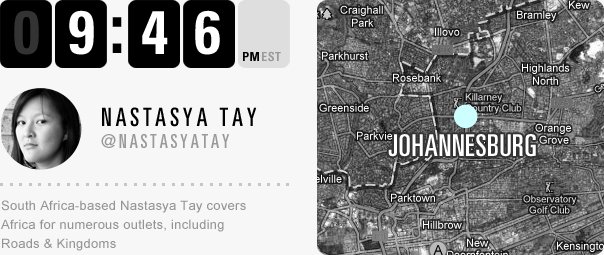
Location: Aguil & Byron’s house, Westdene, Johannesburg
Backyard:
In the air: Crush of damp grass, spring chill, waft of wood smoke, Marlboro Light ash, sparks.
Overheard:
– “Wow, that’s a spangly election night shirt.” “No, it’s my Kinshasa popper shirt.”
– “Personally, I’m excited and apprehensive.” Snorts to my left.
– “The last time we saw each other in Gaza, I ran the other way. And ducked.”
On the breeze: Rodriguez’s Sugarman on iPod
Ongoing topics of conversation: President Zuma’s failed diplomacy, Bruce Springsteen, teleprompters.
On the deck:
Spotted: A 2010 Team USA jacket, paired with Malawian fabric coloured earring hoops.
Amidst the crowd: CCTV (Chinese television)’s posh British Southern Africa correspondent, plus a jazz drummer and a Swedish anthropologist, drinking sparkling wine from the bottle.
Discussion by the basil herb garden: Genocide and Rwandan local transitional justice (in Swedish).
On the table: Johnny Walker Double Black, bottles of Stella Artois, tealights, plastic plates with babaganoush overflow, half-filled glasses of Stellenbosch red.
In the air: Deep voice with an American accent (east coast), smell of match sulfur, clink of glass on tabletop.
Overheard:
“So, is Obama winning?”
“What, you want Romney?”
“Everyone wants Obama, except… Pakistan.”
“He’d better win, otherwise lots of people will be moving to Canada.”
In the living room
Soft furnishings:
Masai blankets, burnt orange floor cushions, South African and USA flags leaning on the grate.
On the wall: Laminated electoral college map, USA electoral vote calendar, Mandela portrait clock, half-blank A4 pages with red and blue scrawl “[?]/538”, acrylic sunflowers on
canvas. NATE SILVER IS EVERYWHERE
On the television: CNN election coverage live, Volume: 39 [out of 100]
On the couch: 4 people, all clutching drinks, none looking at the television.
Spotted: 1 x I [heart] NY t-shirt on Variety’s Africa correspondent, 1 x newly-shaved ex-boyfriend, 1 x Obama ’08 baseball cap.
Overheard:
– “Wait. Did I miss the Johnny Walker?”
– “Oh, are those exit poll results? Did you know this pizza is gluten-free?”
– “No, she’s not coming. She says this isn’t a babysitter kind of election.”
“I had to wear gumboots in Kugelo last year. They were all sitting there in the rain, keeping tally. It was a kind of, victory of humanity.”
In the front garden
On the walls:
South Sudanese flag, South African flag, summer rain stains, American flag
At the table:
A dreadlocked South African social entrepreneur, a freelance French journalist, Business Day, South Africa’s financial broadsheet, pondering.
Overheard:
– “I asked my colleagues what they thought, and they said they were jealous. Jealous that we don’t have the same excitement around elections here. Unless you’re the ANC.”
– “He sounds tired. And Romney doesn’t. That might matter, last minute.”
“I think in some ways, it’s good there isn’t the same hype this year. He’s becoming normalised, just another American President, not the first black American President. But it’s no less important.”
The call to prayer at sunset bursts into Somaya’s Kitchen, a one-woman, hole-in-the-wall-of-a-downtown-alley restaurant, as the feisty Somaya herself swings open its green doors covered in anti-military stickers.
Revolution-inspired art and photographs of early 1900s Cairo overlook political activists nestled between patchwork folk art cushions at three tiny, brightly painted tables, where passionate political debate is standard fare. Today’s table topics: Egypt’s constitution-to-be, a proposed restaurant and shop curfew, the need for interior ministry reform. The U.S. presidential election? Not on the menu.
“We’ve got more than enough to worry about with Morsi,” the 42-year-old Somaya says, roughly chopping a bundle of molokheya, bitter greens common in the Egyptian kitchen. “I didn’t even know about the U.S. election, and I don’t care. Whoever wins won’t make a difference to us.”
Dinner is served: rice with golden vermicelli, green bean stew, and roast chicken. No special today.
***
Arabic-language news of the U.S. election blares from a small TV in an electronics shop in Tahrir Square. 24-year-old Waleed has witnessed his share of Egyptian political instability from the window of this shop, and experienced plenty of financial flux as a result of it.
“Romney is unknown, too risky for the Middle East. He seemed excited to go to war with Iran in the debate,” he says. “With Obama we know what we’re getting—no change—and that’s exactly what we need right now.”
A mass of bodies and vehicles continues seeping into downtown from seemingly out of nowhere, flooding streets and alleys during the after-work rush hours (yes, plural). Many of those bodies end up in a hodgepodge of colorful plastic chairs in Borsa, the alleys around Egypt’s stock exchange, smoking sheesha and playing backgammon.
“We won’t care until America shows interest in Egyptian people, not politics,” 31-year-old professor Mona says, cupping her Nescafe with both hands for warmth as the night cools. “What happened to Obama’s 2009 promise of “dialogue” between the Middle East and West? I’m not seeing that exchange program on the ground.”
Along with the requisite football matches, breaking political news on Borsa’s flatscreens has arrested the attention of hundreds gathered here over the last few years.
Tonight, no one looks up as an aging bellydancer sways mournfully on screen.
Location: iHub office space
Nairobi’s iHub is how urban Africa would like to be seen by the United States. It’s hard to imagine a venue trying harder to be American. An open plan office space for tech startups and wannabes, the hub is all hot desks and faux cafe signs in primary colours. A fussball table dominates the center of the room as an invitation to corporate fun and Pete’s Coffee makes sure the assortment of figures hunched over laptops are caffeinated to Seattle norms. East Africa’s small tech scene, incubated in this airy office, has given itself a moniker with a taste of California: “the silicon savannah”.
And yet it turns out to be a strange place from which to look back at America. Out on the streets of the Kenyan capital the “Yes We Can” bumper stickers have faded, and feature the numbers 2008 if you look close enough, but the love for Barack Obama is still there. No one here has forgotten where the president got his name. On the radio a commercial for a cellphone operator beseeches Americans to re-elect a Kenyan to the White House.
Back at the iHub only the yellow-barked fever trees that reach the fourth floor window interrupt the Americana. The U.S. cultural model is so closely followed that that the opinions – with their weariness and nuance – could be coming straight from a Midwest college campus.
Entrepreneur and mentor Phares Kariuki describes himself as a Republican by inclination. An entrepreneur who believes that government has no business in healthcare, he dismisses his countrymen’s attachment to Obama as “romantic”. A Democrat in the White House tends to mean a foreign policy “with significantly fewer tanks” and recently something of a repaired reputation in the world. But still, he yearns for a Republican party grounded in economic pragmatism and less interest in what people did in their bedrooms. With no 1960s Republican on the ballot in the U.S. the election is not worth staying up for, he says.
The blare of bad music and some shouting in a soup of English and Swahili remind the surfers and networkers that Kenya’s own presidential campaign is around the corner. The startup crowd seems even less interested in that contest.
Only Angela Crandall, who leads a research team at the iHub admits that she’ll pull an “all-nighter with friends” despite Nairobi’s punishing eight-hour time difference with the eastern seaboard of the U.S. But then she does hail from Hawaii. Things would be looking pretty bleak for Obama if he’d lost the support of two homelands in a single term.
Location: A café in Cihangir
I live in the cafe capital of Istanbul, an enclave of narrow streets and early 20th century neo-classical buildings that is home to more Illy cappucino makers and armchair philosophers than the rest of this teeming metropolis put together. That many cafes means alot of screens. And yet, as I make my rounds, none are tuned to coverage of the US elections. A muted football game on one, a talent show on another.”Elections?” queries a friend I meet for coffee. ”Oh, those elections.” She shrugs. It starts to drizzle outside.
It was so different four years ago when these same cafes stayed open till the wee hours as votes were counted. HOPE was a slogan that resonated everywhere. The US under Obama seemed –briefly- to hold out the promise of something other than business as usual in the Middle East. Something that was about more than business, oil and geopolitical calculation. This is a city that embraced Barack Obama early on when–during his first overseas trip as president–he chose it to declare ‘a new era of American engagement with the world’. That era has yet to come.
I confess to forgetting repeatedly about the US elections today. I was reporting on a mass hunger strike by some 700 prisoners demanding Kurdish education and court rights and an end to the isolation of PKK rebel leader Abdullah Ocalan, serving a life sentence on an island jail. It is Day 55. They are surviving on sugar water and liquid vitamins. Beyond this, doctors warn, the body starts to shut down. People could soon start to die. The octogenarian Yashar Kemal, perhaps Turkey’s greatest living novelist and a mountain of a man, barely able to speak, made a rare appearance to entreat a government that is seemingly oblivious. ”There is no pain greater than watching a human being starved to death,” he said. ”If people die, we will all be responsible.”
How does this tie into US elections? It does. The Obama administration, like Bush before it, has held Turkey up as the great regional role model. Democratic, mostly Moslem, officially secular and prosperous. You’ve heard it countless times. And so, in what one assumes has been one of those behind-the-scenes ‘you scratch my back’ agreements, Turkey’s domestic democratic scorecard has not been so important. Its continued policy of denial towards the Kurds has gone unchecked. Turkey now has more jailed journalists than China. The country teeters on the brink of war with neighbouring Syria. There is a real sense of fatigue and HOPE is in short supply.
Location: A home in Tblisi…
Don’t tell anybody, but after I put my daughter to bed just now, I went outside and had a smoke. I quit four years ago, but with my wife in western Georgia on assignment, my daughter getting over a stomach virus and two impeding deadlines breathing down my neck, it just seemed like the thing to do. I looked up at my grape vines and realized I hadn’t picked any this year.
I blame my regressions on Tbilisi, which is lit up as usual down the hill, but somehow the wattage seems to be low. A political hangover has gripped the city; the result of an increasing factional crescendo that had been building up all year–the likes of which had not been seen since civil war in 1992. When Mikheil Saakashvili gracefully conceded his party’s defeat in parliamentary elections to a multi-billionaire last month, it was like a big stink bomb went off that had no smell. We’re still waiting for the funk.
This can explain why nobody around here gives a shit about the elections in the U.S., except for a group of American expats who have been spamming me to get my patriotic mojo together with them at the bar to bash Romney. After ten years in Georgia, this is the most politically active group of expats I’ve seen and unlike Georgians, they are all Democrats.
Georgia’s affliction with the Republican party began with Ronald Reagan, of course. My complaint that Reagan cut my funding for higher education and busted unions falls on deaf ears here and elsewhere in post-Soviet space. Then Clinton put Georgia on the map by laying a pipeline across the country, but the Georgians only respected him he for his Lothario reputation. The Republicans made a comeback in 2002 when Bush sent Marines to train and equip Georgians to fight the terrorist threat in a valley near the Chechen border. By 2004, when Saakashvili’s young reformers came to power, Georgia was a firm neocon satellite country. The next year, Georgia became Bush’s famous “beacon of democracy” and the bond between the two countries was unwavering until Russia invaded Georgia in 2008 and Bush’s cavalry never arrived.
Georgians are all about personalities. In 2008, nobody knew who Obama was, but they knew about McCain. He was the guy who said, “Now everybody is a Georgian,” during the war. I told a taxi driver McCain said that when he looked into Putin’s eyes, he saw K-G-B written in them. Needless to say, I got a free ride that night and McCain ended up carrying Georgia, one of the three nations he won globally. Romney, a non-personality, is a total unknown.
Tomorrow, I’ll go to the hotel with all the expats to watch the official results come in over breakfast. I’ll try to act like it means something, like an Obama victory will be better for Georgia than a Romney one. But I’m with rest of the Georgians on this. I’m too politically hungover to really fuss about it.
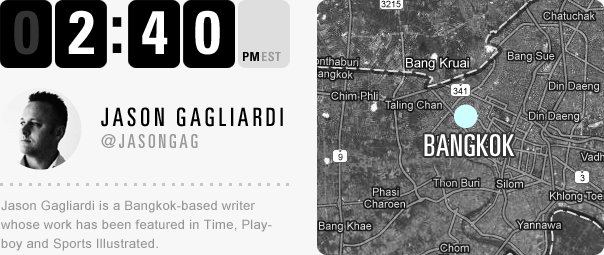
Location: The streets of Patpong
Fear, trepidation and disappointment stalks the streets of Patpong Road tonight, as voting begins in the US presidential elections.
Fear flashes across the face of Nong Ning, one of several ladies loitering outside a blowjob bar with the unlikely name Star of Light, when I tell her they are voting in America right now. “No drink alcohol tonight?’’ she asks. On the eve of local elections booze is banned in Bangkok, which means slim pickings for the nongs (younger sisters) of Patpong.
Trepidation creases the mamasan’s greasy features when I enter the small and dingy bar. Three girls hover around a single elderly fellow, making half-hearted, darting grabs for his crotch. No oracle appears, despite the name’s vague promise of prophecy. Nothing is illuminated.
“Obama or Romney’’ I ask. “Obama black man. Maybe he big,’’ one girl offers. The mamasan sniffs. “I like Bush’’.
Disappointment, suddenly and crushingly, is all mine. I am in Bangkok’s heart of darkness, its ur-strip of sin and sleaze, where dank doorways portend parades of pudenda, and I am four years too late. For the first election in years, there is no Bush.
Bush had been ubiquitous in Bangkok. ‘Good Bush, Bad Bush’ the t-shirts observed, juxtaposing George W’s idiot grin with a luxuriant tangle of pubic hair. ‘Fuck you Bush’ said the matter of fact graffito on a construction hoarding near my home.
Dizzy with visions of puns unpenned, sick with the sense of loss, I lurch from the Star of Light, running the gamut of importunate hawkers, proprietors of ping pong emporia and leering ladyboys. I stop, catch my breath, bat away a midget trying to sell me Viagra and remind myself of the mission. The US Presidency has a long, lewd history with the hummer, from the Kennedy clan’s Camelot kneetremblers to Bill Clinton’s intern eruptions, sticky dresses, exploding cigars and limp excuses.
This time, the entire electoral process sucks, from the first broken promise to the last forlornly flapping chad. “Campaign sucks hope out of US public,’’ sniffs Christopher Caldwell in the Financial Times. “How the World’s Greatest Democracy Sucks at Elections,’’ Esquire explains to its readers. Vice.com laments how ‘Voting Tech Still Sucks’, while Sheknows.com wonders if it “sucked more to be Michelle Obama or Ann Romney’’.
But it is the Street Art Gum Election 2012 that posed the crucial question: “Obama vs. Romney – Who Sucks the Most?”, allowing voters to decide with one spit of their gum.
There is a perverse symmetry in asking a posse of Patpong oral sex experts which US Presidential candidate sucks hardest. It seems right, somehow, to finally give them a voice, considering Patpong has been getting screwed by Americans since the Vietnam War.
I ascend the steep narrow stairs to Kangaroo Bar, perch on a barstool, noticing the décor is strictly Down Under, as are some of the staff. From a dark room at one end of the bar, shadowy movements and furtive slurping issues. I recall asides about golf-balls and garden hoses, and suck-starting leaf blowers.
I press on with my quest. But the mission is a bust. No one in the bar, at least no one capable of speaking, has a clue who Mitt Romney is. They know the name Obama, and agree this must be a good thing.
“Mitt,” said a tall girl named Chicken, “sounds like the Thai word for knife.”
“Good Mitt or Bad Mitt?’’ I press. She frowns. Then smiles. “Bad if you are unfaithful. In Thailand, we use the knife to chop off the penis and feed it to the ducks.’’
Location: Our Living Room in Shin Darkhan
It’s tough for other countries to compete with Mongolian politics. The political season surrounding the June 2012 elections brought us a former president being arrested in his socks in a pre-dawn raid. Then there was the contested election itself, which provoked a procedural fight for majority leadership while foreign investors freaked out about an “unstable” government. Maybe best of all, there was a pretty impressive sucker-punch thrown during an incident between two elected officials in the Government Palace after a parliamentary session. Yes, the world is watching the US elections, but Mongolian entertainment standards are high.
So the night before the US election, my husband and I settled in on the couch for our nightly 8:00 pm news surfing. Coverage of the elections was sparse on Ulan Bataar-based television stations, save a few pundit panels recapping the most recent debates and rallies, and reporting a tight margin in opinion polls, but they were dull. The buzz-iest segment was about the roster of celebrities who have endorsed Obama. These are household names in international pop culture, like George Clooney, Sylvester Stallone and Beyonce. Obama’s got the popular vote here, even if he’s black (these… things happen in homogenous cultures…) so he gets the majority of air time here. What’s the attraction? He’s friends with famous people, comes off as a genuine and generous guy, and he’s got the same affability as Mongolia’s most popular homegrown politicians. Romney, Mongolians say, is reminiscent of the more suspect Mongolian politicians, the older communist officials who adapted to the emergence of democracy and capitalism after 1990 by getting cozy with foreign corporations. These guys are often prone to corruption, more likely to have unregulated foreign bank accounts, and definitely not in keeping with traditional Mongolian values. Despite the Romney family affinity for horses, which Mongolians could really sympathize with, Mitt is most often mentioned simply as the competition.
We’ll tune in tomorrow to see what US voters decided to do while we were sleeping. On the other side of the world, even in a place where nearly half the population still live as nomadic herdsmen, the decision matters.
Location: The Ramallah Cafe
The Ramallah Cafe offers anything but a dull cup of coffee. Its smoky rooms regularly fill with animated political discussion and perhaps no more so than on election day—that is, US election day. The Israeli-Palestinian conflict has been a curiously prominent fixture of the US presidential election. As Israelis watch the election unfold with baited breath in Jerusalem and Tel Aviv, Palestinians in Ramallah take a more sober approach to the election which might come to define politics in the region for the next four years.
As Americans are lining up to vote, a steady stream of Palestinians trickle in and out of Ramallah Cafe to check the blaring satellite channels Al Arabiya and Al Jazeera for election updates. An unmistakable cloud of despair hangs over debates about what this election means for Palestinians. “Most, if not all, Palestinians want Obama” Ramzi, the cafe owner tells me. “But you have to understand that both of the candidates are not great for our interests.”
Without a woman in sight, locals argue about Obama’s last minute strategy with a sterling knowledge of the complexity of the electoral college. “Without Florida, Obama stands no chance” Ahmed Faroui muses between long draws of a shisha pipe. “Romney is like a junk yard car dealer. He buys cars, strips them and makes a decent amount of money. He will be bad for America if elected.”
While Obama’s Muslim heritage is a repeated talking point during the election campaign, few Palestinians make note of it. Instead, discussion focuses on Romney’s economic record and his close relationship with Israeli Prime Minister Benjamin Netanyahu. “I expect more of the same in Palestine if Obama wins. More settlements and little action from the United States” Fadi Rahman notes just after ordering his fourth cup of strong Arabic coffee, “But I am scared of what will happen if Romney wins today.”
Entering the cafe late in the afternoon, a boisterous young Palestinian man insisting on changing the channel to CNN International, sums up the general Palestinian feeling on the election, “American people good, American government bad.” As it happens, CNN International is live in Jerusalem gauging Israeli reactions to the election developments.
Location: The British Library…
“Vice-President Joe Biden is currently voting” was the last news alert I saw on the BBC Website’s LIVE Voting Under Way US Election 2012 page before I went for lunch.
Although its food is expensive and really not that good, the British Library has great opportunities for lunch. If you’re careful, you can smuggle your sandwich into the museum and eat it while admiring an illuminated gospel from the end of the seventh century.
This is US Election Day, however, and I have the fate of Joe Biden to hold my attention. Even the Lindisfarne Gospels could not distract me.
Why did the journalist not wait for Biden to have voted before phoning in his story? What was newsworthy about him specifically being in the act of voting? Perhaps Biden never did vote. A frantic journalist in Delaware might have called in a story while I was offline: “a freak wave has washed the vice-president away and a dolphin has eaten his ballot paper”. The BBC’s headline: “Biden prevented from casting ballot by dolphin, whereabouts unknown”.
I get out my phone and check. Biden’s fate is unmentioned. The news has moved on: “Virginia Senate candidate and former governor Tim Kaine leaves his polling place in Richmond, Virginia”. I start to worry about Tim Paine now. Did Tim Kaine even get to vote? Did they force him to leave before he voted? Perhaps a dolphin intervened there too.
I check for security guards and take another surreptitious bite of sandwich: cheese, adjika and cucumber.
While I chew, I examine one of only three copies of the first printed English bible, then a 1623 first folio of Shakespeare, then the original copy of The Ballad of Reading Gaol, and then a Jane Austen manuscript (the 2012 election subtitle for Pride and Prejudice: “a woman’s right to choose”).
At 1.16 pm the BBC tells me Mitt Romney will vote in Belmont, Massachusetts, then move onto to Cleveland, Ohio and Pittsburgh, Pennsylvania. It’s lucky he doesn’t believe in carbon footprints, or that itinerary might make him feel bad.
I finish my sandwich while scrutinising a Mercator map of North America from 1580. The map is called the “Brytish Impire”. It might not be British anymore, but I can’t help worrying about who it is in the process of electing. I hurry back to my computer to check.
Location: In Hamra, Beirut…
It’s election day and there’s a tarantula in the bathroom. Ominous signs are piling up. After lunch, my daughter has trouble getting to sleep. She says the prayer wakes her up. In a darkened bedroom, my wife is hoping to nap, too tired to take off her shoes. She just returned from Aleppo, where at least one commander says he would vote for Romney, assuming a President Mitt would give the guys with guns some better guns, maybe some surface-to-air missiles, and perhaps even a no-fly zone.
I’m thinking about Syria, when I pass the local offices of the Red Cross, where a fleet of SUVs is waiting. Out front are pallets of humanitarian aid. There’s Surgical Drainage Material and Dressing for Burns. At the day care next door, I watch a father bound up the stairs to the front door, a big smile of anticipation on his face. He just wants to pick up his kid. I’d like to get a giant wad of cash — always a safe bet to be prepared, here in Beirut — but I can’t go the ATM today. We’re waiting for some money to clear. Today, everyone’s waiting for something.
At the dead man’s house the guard shack is empty. Seniors in dirty pants sit on plastic chairs, smoking cigarettes down to the filter. Sunflower seeds litter the ground and women I’m pretty sure are prostitutes peek from behind curtains. I am nearly killed as a scooter zooms past, roaring down the sidewalk, thinking of only himself. The girls at the cosmetic store look bored. They have shirts that say Beauty Expert. I’m so far from the United States today, but my vote was in the mail weeks ago. At the cafe, beggars want money, that sad woman I always see is still reading poetry, and I order my usual, waiting for whatever comes next.
“The leader of the free world” is a title with an audacious ring, especially in a 21st century political landscape where superpowers shrink with each passing election. And yet, there is still a widely held belief that the fate of the American elections will have a profound impact on the rest of the world. According to a recent Gallup International poll of 26,000 people in 32 countries, 62 percent believe the US president has a major effect on their lives. Not coincidentally, 42 percent of those surveyed thought they should be able to vote in the American election.
With Election Day upon us, we’ve reached out to 25 correspondents in 23 countries around the world and asked them to take the pulse of the global electorate, to visit bars and restaurants, street corners and coffeeshops, embassy election parties and friends’ living rooms to see what the rest of the world thinks about the prospects of the American presidency.
We’ll be releasing dispatches over the course of the next 24 hours, bouncing around the globe to capture the buildup to the vote, the anxiousness as the counts start trickling in and the world’s reaction once the race is finally called. Tune in.

